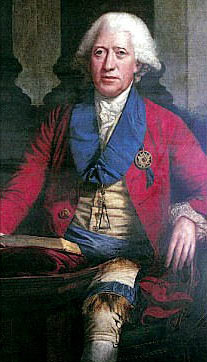Get Today in Masonic History into your Inbox. Sign up today for one of our email lists!
Need an article for your Trestleboard/Newsletter see our Use Policy
Thomas Dunckerley is Born

Today in Masonic History Thomas Dunckerley is born in 1724.
Thomas Dunckerley was a prominent British Freemason and Naval officer.
Dunckerley was born on October 23rd, 1724. At the age of 10 Dunckerley was apprenticed to a barber and wig maker in Westminster. In 1737, he ran away and join the Royal Navy. The next record of him was a listing as an able body seaman on board the HMS Namur. In 1745, according to records he was certified a school master on board Royal Navy ships. In 1746 he was appointed Gunner, equivalent to Chief Gunnery Officer, on board a sloop. He moved on to assignments on larger vessels of upwards of 90 guns. From 1757 to 1761 he was stationed on board the HMS Vanguard which saw combat during the siege of Quebec. He left naval service in 1764, although he could not collect his retirement due to incomplete paperwork. Due to debts he was forced to return to a life at sea until 1767.
In 1760, Dunckerley attended his mother's funeral. There he was informed by a neighbor his mother confessed she had an affair with the Prince of Wales, who became King George II, and he was his true father. He did nothing with the information at the time as he was still in the Navy and scheduled to go to sea shortly after the funeral. In 1767, after making his way back to England via Gibraltar, he was able to speak with several ranking individuals as well as financial assistance from Freemasons, he made his case of his Royal connection. King George III accepted his case and he was given a £100 annuity which grew to £800 annuity. His actually connection with the Royal family came into question at the end of his life and there is still some question as to it's legitimacy.
Dunckerley was initiated in 1754 into Lodge No. 31 in Portsmouth. In 1760, he received a warrant for a lodge aboard the HMS Vanguard, which he used to create London Lodge (now No. 108). Also when he was on board the Vanguard he received a roving commission from the Premier Grand Lodge of England to inspect the state of the craft where ever he traveled. Under the commission he installed the first Provincial Grand Master of Quebec. On board the HMS Prince he received a similar warrant which he transferred to the HMS Guadeloupe.
Starting 1767, Dunckerley was appointed the Provincial Grand Master of several counties in England. In 1785, he founded the Lodge of Harmony No. 255 in the city of Bristol. It was on Dunckerley's insistence the Province of Bristol was created, which is unique in all of English masonry as it is the only Province which consists of only one city.
In the conflict between the Antients and the Moderns, Dunckerley was a Modern, although when it came to ritual he sided with the Antients. In 1766 he formed a Grand Chapter of Royal Arch Masonry. Dunckerley is credited by some with developing the Marked Master and Mark Masons degrees and first introducing it in 1769. Albert Mackey blamed Dunckerley for splitting the 3rd degree when he created the Mark Mason degree, although their is evidence the degree existed in some form prior to his initation into the Royal Arch.
Dunckerley passed away on November 19th, 1795.
This article provided by Brother Eric C. Steele.

